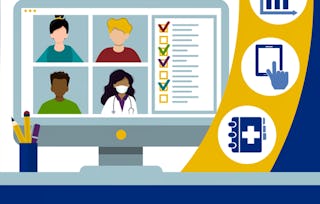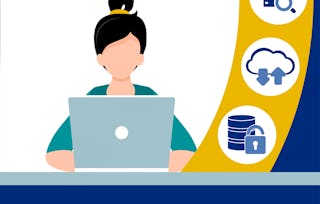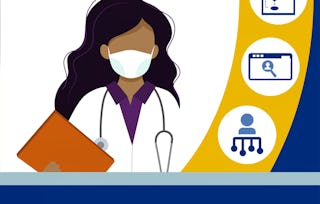This is a very exciting time to be exploring a career in Health IT Support! In this introductory course, you’ll learn about various roles in IT support that are common in healthcare. IT support staff play critical roles in many different healthcare venues. In addition to helping clinics, hospitals, and emergency rooms, you may end up providing support in a skilled nursing facility, ambulatory surgical center, virtual care setting, or even a patient’s home! On any given day, you may interact with nurses, physicians, pharmacists, physical therapists, social workers, other allied health professionals, patients or caregivers. Each of these individuals rely on IT support specialists to help them maintain a high reliability healthcare organization. As you learn about what makes Health IT unique, we hope you find inspiration in the stories shared by some of our very own IT support staff at Johns Hopkins. They’ll talk to you about the most common problems they help resolve as well as the complexity and range of issues that arise. Whether you dream of being an end-user computer support specialist, working at a healthcare help desk, or rising to an analyst role, we’re thrilled that you are embarking upon this journey. Welcome again!

Ends soon: Gain next-level skills with Coursera Plus for $199 (regularly $399). Save now.

The Critical Role of IT Support Staff in Healthcare
This course is part of Healthcare IT Support Specialization


Instructors: Ashwini S. Davison, M.D.
27,295 already enrolled
Included with
(763 reviews)
Skills you'll gain
Details to know

Add to your LinkedIn profile
3 assignments
See how employees at top companies are mastering in-demand skills

Build your subject-matter expertise
- Learn new concepts from industry experts
- Gain a foundational understanding of a subject or tool
- Develop job-relevant skills with hands-on projects
- Earn a shareable career certificate

There are 2 modules in this course
This first module is designed to pique your interest about the exciting world of Health Information Technology, or HIT. Over the past decade, technology has had a tremendous impact on the way healthcare is delivered. As the work of clinicians, hospitals, and health systems has been re-imagined, the need for IT Support Specialists has grown. As you learn about what’s unique when working in Health IT (HIT) and what some common roles are, you’ll even see some examples of what a day-in-the life of an IT support specialist in healthcare looks like. You'll watch a help desk agent field a call from a very frustrated surgeon and through empathy and clear communication, helps to resolve the matter. During this module, you’ll be introduced to Johns Hopkins employees who are passionate about the critical role they play every day. They’ll share stories of inspiration and words of advice on how you can get your foot in the door as a Health IT support specialist. What are some examples of difficult calls they’ve handled? What are some of their proudest moments on the job? What are the most common IT issues they've helped troubleshoot? What kinds of tickets will you be helping to close someday? Get started to hear the answers to these questions and many more!
What's included
7 videos1 assignment
There are a variety of IT support roles that are important for keeping a hospital or health system running. In this module, you’ll learn about the kind of work that’s involved in this important and growing field. You’ll hear about what it means to be a high reliability organization and the kinds of leadership and communication skills you need to have to work in this space. You’ll get to see behind-the-scenes footage in the hospital where an IT support staff member helps a patient with their request. In another scene, you’ll see an IT support team member calmly troubleshoot an error message that a nervous employee is receiving. One of the unique aspects of healthcare compared to other fields is that there are so many clinical terms and topics that might be new to you. We want you to slowly gain exposure to the language used in hospitals as well as familiarity with terms such as chest x-rays, CT scans, second opinions, HIPAA, patient portals. Continue along to gain a better understanding of what’s involved in being an end-user computer support specialist, a help desk agent, or a healthcare IT analyst. No matter what step you take next in your career journey, just know that the rapidly growing field of health IT support has a place for you!
What's included
6 videos2 assignments
Earn a career certificate
Add this credential to your LinkedIn profile, resume, or CV. Share it on social media and in your performance review.
Instructors

Offered by
Explore more from Health Informatics
 Status: Free Trial
Status: Free TrialJohns Hopkins University
 Status: Free Trial
Status: Free TrialJohns Hopkins University
 Status: Free Trial
Status: Free TrialJohns Hopkins University
 Status: Free Trial
Status: Free TrialJohns Hopkins University
Why people choose Coursera for their career




Learner reviews
763 reviews
- 5 stars
82.69%
- 4 stars
12.05%
- 3 stars
3.27%
- 2 stars
0.65%
- 1 star
1.31%
Showing 3 of 763
Reviewed on Aug 17, 2025
Very informative and easy to understand, and the video materials were also helpful.
Reviewed on Nov 4, 2021
I enjoyed listening to the perspective of health care workers demonstrate the importance of IT support and there roles
Reviewed on Mar 23, 2022
As an IT support personnel in Healthcare , this course was very helpful in understanding the basics of IT Support role in Healthcare.

Open new doors with Coursera Plus
Unlimited access to 10,000+ world-class courses, hands-on projects, and job-ready certificate programs - all included in your subscription
Advance your career with an online degree
Earn a degree from world-class universities - 100% online
Join over 3,400 global companies that choose Coursera for Business
Upskill your employees to excel in the digital economy
Frequently asked questions
To access the course materials, assignments and to earn a Certificate, you will need to purchase the Certificate experience when you enroll in a course. You can try a Free Trial instead, or apply for Financial Aid. The course may offer 'Full Course, No Certificate' instead. This option lets you see all course materials, submit required assessments, and get a final grade. This also means that you will not be able to purchase a Certificate experience.
When you enroll in the course, you get access to all of the courses in the Specialization, and you earn a certificate when you complete the work. Your electronic Certificate will be added to your Accomplishments page - from there, you can print your Certificate or add it to your LinkedIn profile.
Yes. In select learning programs, you can apply for financial aid or a scholarship if you can’t afford the enrollment fee. If fin aid or scholarship is available for your learning program selection, you’ll find a link to apply on the description page.
More questions
Financial aid available,

